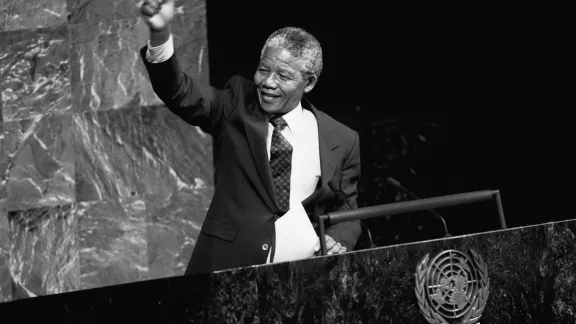
UN Photo/P Sudhakaran
LWF Praises Former South African President as “One of the Most Inspiring Persons of Our Time”
(LWI) The Lutheran World Federation (LWF) has paid tribute to former South African President Nelson Mandela, who died yesterday, aged 95, “as one of the most inspiring persons of our time.”
“We join with his family, the people of South Africa, and people all across the world in prayer and mourning, but also in celebration of the character and accomplishments of this great man,” LWF President Bishop Dr Munib A. Younan and General Secretary Rev. Martin Junge said in a joint statement today.
“He stood for principle, he fought for justice, he made for peace,” the LWF leaders added in the message of condolence for the celebrated anti-apartheid activist, who served as South Africa’s first democratically-elected president from 1994 to 1999.
During South Africa’s apartheid period, Mandela was convicted of attempts to use violence to overthrow the then government, and was imprisoned for 27 years until his release in 1990, following a global campaign. In 1993, he shared the Nobel Peace Prize with former President Frederik W. de Klerk.
“He devoted his life to building a new South Africa—a country in which all are equal under the law, a country in which racial discrimination and apartheid have no place, a country in which, in the words of Martin Luther King, people are judged by the content of their character, not by the color of their skin,” the LWF said.
During his time in prison, Mandela was resolute, never wavering in his confidence that the African National Congress anti-apartheid struggle was just and that it would end in victory.
“He taught the white South Africans—indeed all South Africans—that all have a place in the new South Africa. All would be treated with dignity, all would be protected by the constitution, all would be full citizens,” Junge and Younan said.
Mandela, who voluntarily stepped down at the end of his first term as president, understood that reconciliation was key to a lasting peace in South Africa and that there was no room for either vengeance on the one hand, or erasing the past and pretending there was no wrongdoing, on the other.
“He understood that a people without a memory is a people without a future,” the LWF emphasized. In setting up the Truth and Reconciliation Commission, Mandela allowed for a process of confession and forgiveness so South Africa could move forward, the LWF statement added.
“Thanks be to God for Nelson Mandela,” the LWF leaders concluded.


